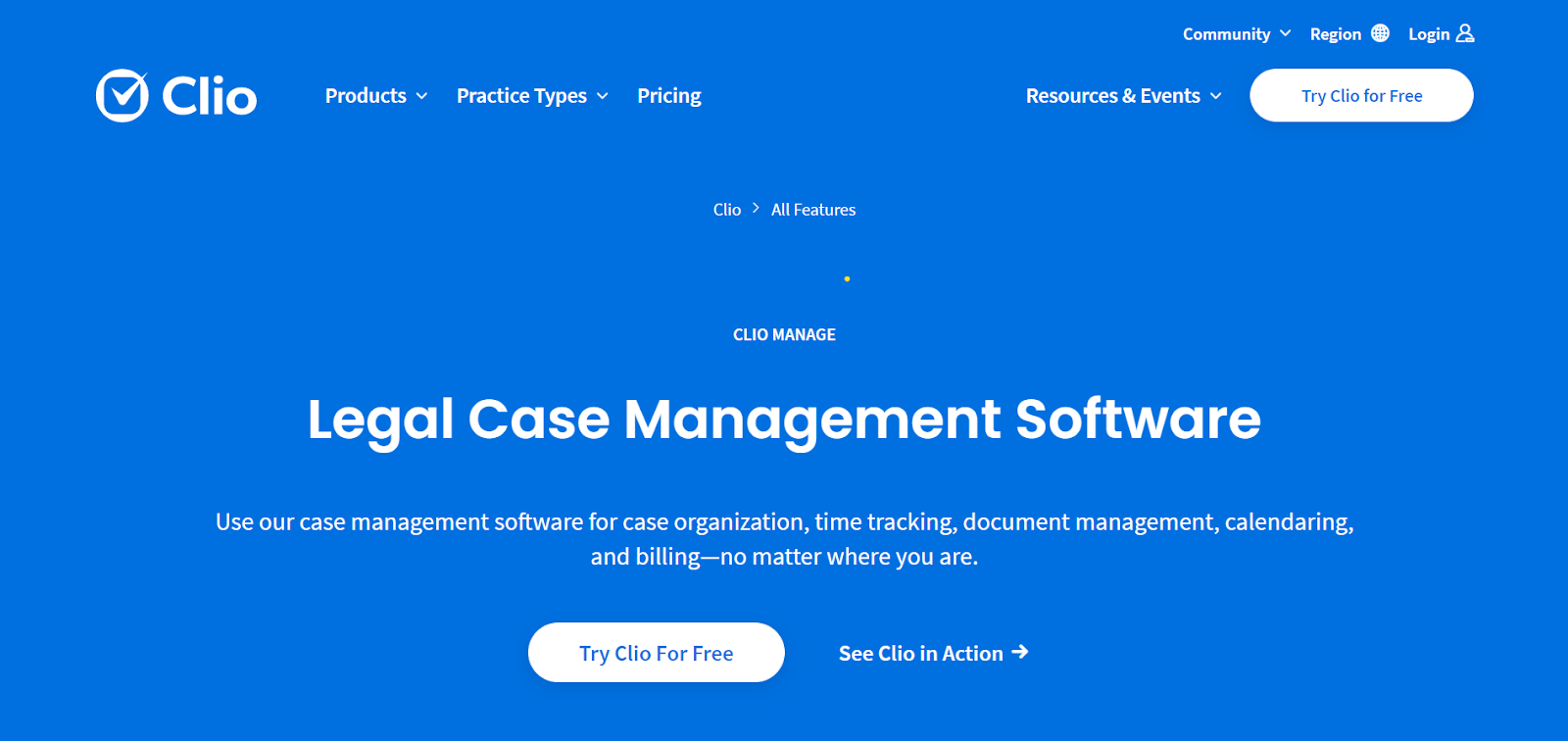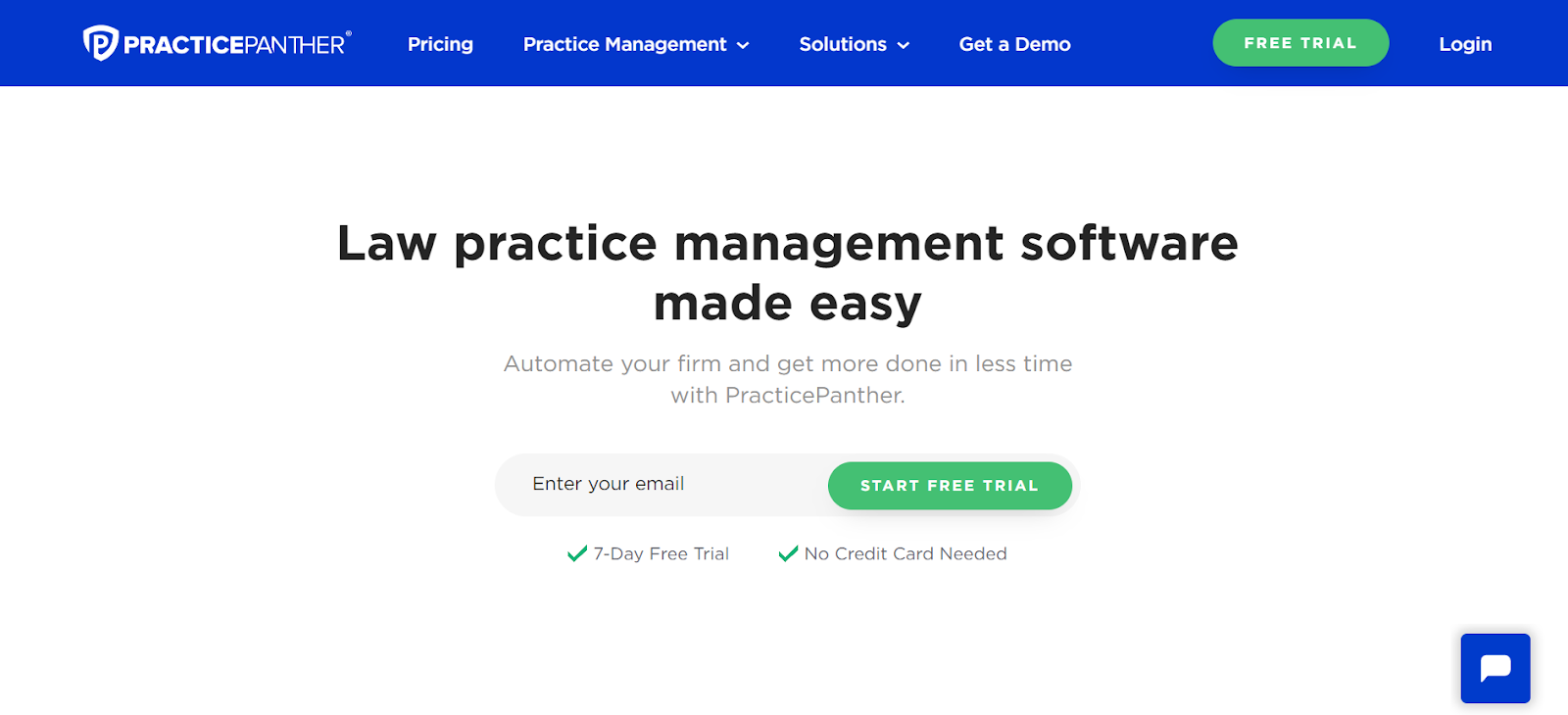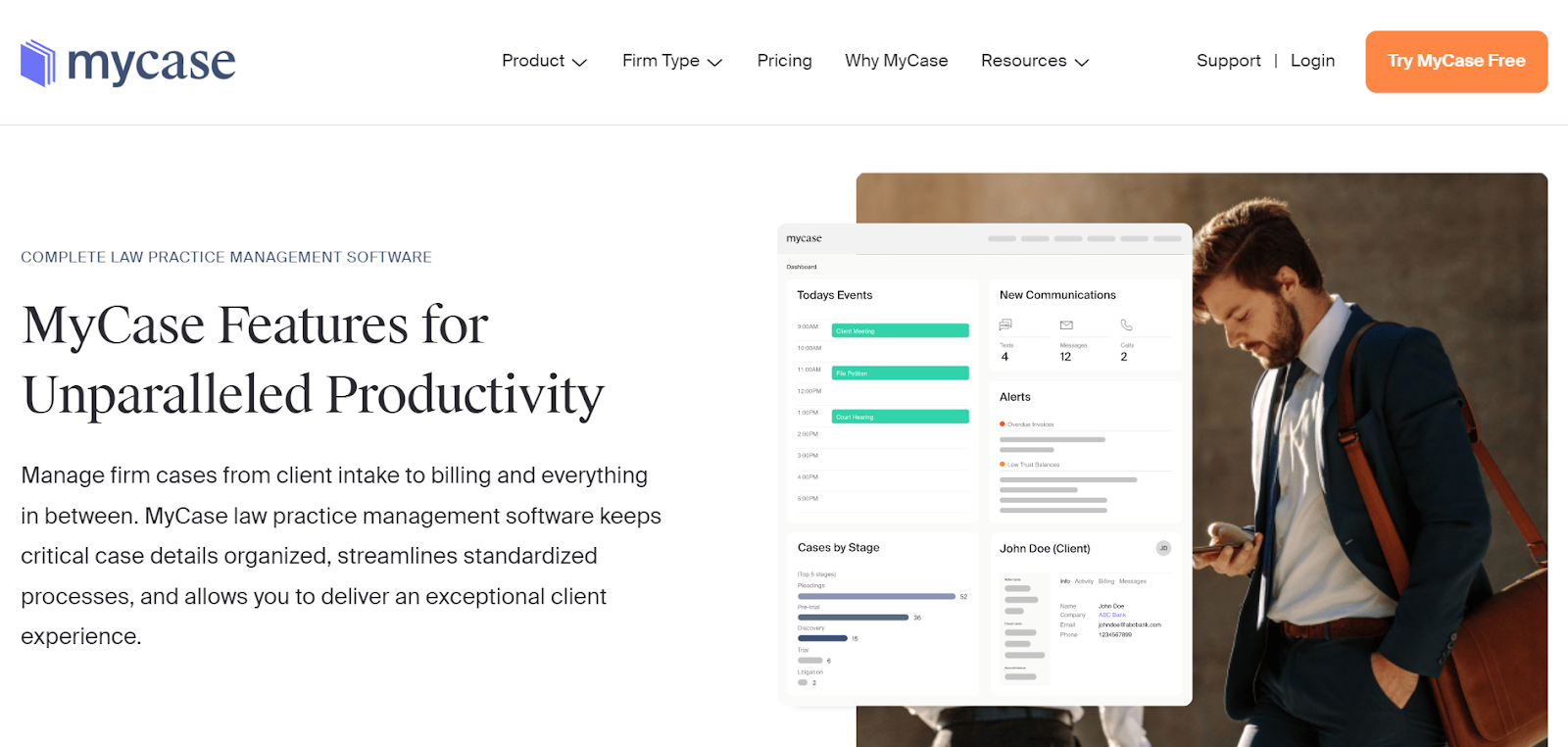A few things hold true in the modern legal industry:
- Having an effective legal technology stack for your law firm is crucial to be client-centric and meet the modern working demands of today’s lawyers and legal professionals.
- Demand for legal services continues to grow. This means that firms will be dealing with more customers than ever, and traditional customer management systems (e.g., pen and paper, spreadsheets) are simply not going to be able to handle the upscale.
- Clients want to be kept in the loop about their case and its progress. Plus, lawyers on the go should be able to access information on demand. Legal software reduces the burden on lawyers to keep constant direct contact with clients (through phone or email) and allows them to access important documentation on the go.
In short, these days it’s basically impossible to run a successful law firm without embracing legal tech. When it comes to building an effective tech stack for your firm, a legal case management system is one of those pieces of software that is a must-have.
Let’s start by discussing what a case management system is and what it does.
What is a Case Management System?
A case management system for law firms stores client data (case notes, pricing and billing information, communications, etc.) in one centralized location for easy access. Using this software, law firms can automate their workflows and simplify task management, scheduling, billing, and much more.
Think of a case management platform as the core legal technology solution for a law firm, which all other software can connect and integrate with to maximize efficiency and productivity.
How Does a Case Management Tool Help Your Firm?
Using legal technology in a law firm is standard practice today, but how the law firm uses technology is an important consideration.
Every law firm has its own policies, processes, and procedures for different types of work, but these are often individualized— one lawyer may prefer email to instant messaging for the majority of communication, while another prefers phone calls, meaning they may take longer to respond to email, which inadvertently stifles streamlined communications.
This is because law firms, like any workplace, employ individuals with different levels of comfort and experience with technology—meaning that consistency, communication, and information-sharing can suffer as everyone acts on their own preferences.
The goal of a case management tool is to get all professionals in a law firm using the same communication and information-sharing methods so consistent and effective processes can be developed.
A case management platform helps with this by:
- Improving accessibility of information and making communication and knowledge-sharing within your law firm easier
- Organizing and storing all client information and legal knowledge documentation in one place so it’s easy to find
- Automating workflows and tasks so that lawyers can focus more on billable work
- Integrating with other software solutions so that lawyers can work within one friendly techstack ecosystem
- Providing a consistent, effective way to handle matters from start to finish
This not only helps with keeping everyone on the same page in terms of law firm operations and client matters but contributes to a more client-centric experience by allowing legal professionals to provide streamlined consistent customer service.
Benefits of Case Management Systems Software

Aside from streamlined operations and providing a more client-centric experience, there are several other benefits that case management systems software can provide, including:
Increased Scalability
Law firms that are interested in scaling their services will benefit from adopting software that can scale with them. Even if a law firm isn’t interested in scaling quickly, as demand increases for legal services in general, even smaller law firms are likely to feel the pressure to take on more clients. A case management system can help keep legal services consistent and up-to-standard even when the workload increases.
Improved Client Communication
Clients often expect lawyers to communicate with them on demand, which isn’t always realistic from the lawyer’s perspective. Still, endless phone calls, texts, and emails can quickly affect the flow of a conversation and cause details to be missed, affecting the level of service that the client expects. But understandably, clients want updates on their matter, they want to update their lawyer with any new information relating to their matter, and overall prefer a direct line of communication with their lawyer.
A case management system with a client portal can help ease some of the client/lawyer communication pressure. A self-service client portal allows the client to log in whenever they want to check case status, upload documents relating to their case for their lawyer to review or send their lawyer a message. This saves time for both lawyer and client by eliminating unnecessary back-and-forth, provides a secure, reliable way for the client to share documents and information, and overall helps deliver a more client-centric legal experience.
Time Savings
The 2021 Legal Trends Report by Clio suggests that as much as 16% of billable time is not included in the client’s final invoice. Whether a law firm still uses the billable hour or if they’ve switched to alternative fee arrangements—extra time spent on a matter that doesn’t reflect on the client’s bill suggests possible process inefficiencies and/or a fear of presenting clients with a bill that exceeds the originally quoted amount.
Fixing process inefficiencies isn’t focused on charging clients more for a lawyer’s time, it’s more about marrying consistency, competency, and client-perceived value of service. One of the ways that a case management system can help achieve this is through time-saving tools, such as automations, that synchronize data across integrated platforms (e.g., client information between the case management system and a legal pricing tool like AltFee) or complete tedious, repetitive tasks (e.g., sending confirmation emails or meeting reminders).
Improved Work-Life Balance
More and more lawyers are working remotely than ever before, with the pandemic being an obvious catalyst. The draw for remote work for lawyers is increased work-life balance and in some cases, the ability to set their own work schedules. But as the 2022 Legal Trends Report by Clio points out, one caveat of working remotely that lawyers have had to contend with is the blurring of work and one’s personal life, as ease of accessibility means that work can be done anytime, anywhere.
Law firms that employ remote lawyers need to strongly consider how the software that they use supports them, not only in ensuring that operations run smoothly without someone present in the office, but also how to streamline workflow to help maintain work-life balance.
A case management system can act as a single source of truth for your legal professionals and automate tedious tasks like sending client reminders and providing onboarding information for new clients (such as logging into a self-service client portal, for instance), and much more. Better project management allows a legal professional to spend less time on a project overall, allowing them to focus on other work with some of the heavy lifting automated for them.
Start Earning More Revenue with Fixed Fees
Break free from hourly pricing and take the fear out of scoping and pricing client projects to start maximizing profitability.
Book A DemoWhat to Look for in Case Management Tools
Choosing the right case management system for your law firm can seem daunting, especially with the large number of offerings out there. Ease of use as well as a good balance of features to price are two great considerations, but there are more capabilities that you should look for as well:
- Security. A cloud-based secure platform is the gold standard for case management software in today’s world. This ensures legal professionals can access information from anywhere and communications are encrypted.
- Integration. Compatibility and connectivity with your firm’s current tech stack is essential to keep things running smoothly and ensure information stays updated in every system.
- Customization. Every law firm will have their own processes, policies, and procedures, meaning that a case management system should be adaptable to that fact. Customizable checklists, forms, and document templates are a few examples of customizations that you should look for.
These high-level considerations are a good starting point, but let’s get into more detailed features of case management systems that you should be looking for.
6 Key Features of Case Management System Software

|
Case Management System Software Feature
|
What It Does
|
|
Client intake
|
Centralizes client information and streamlines the intake process by using customizable client intake forms, sending automated welcome emails with next steps or instructions, and more.
|
|
Workflow and scheduling
|
Streamlines workflow and makes scheduling easier by having one place to assign and prioritize tasks, keep track of deadlines, and send automatic reminders.
|
|
Secure communication and file sharing
|
This ensures that communications and files are always secure, whether they be shared through a self-service client portal, email, or within the case management system itself.
|
|
Matter and document tracking and management
|
Allows changes, updates, and other details affecting specific cases and documents to be viewed in one area (sometimes in real-time) so that nothing falls through the cracks.
|
|
Access control
|
Allows permissions to be set to control access to sensitive information and documents, while still allowing users to access other parts of the system.
|
|
Improve colleague and client communication
|
By having a case management system as the one source of truth for your law firm, communications can be streamlined and controlled.
|
Recommended Law Firm Case Management Systems
1. Clio

Source
Clio is one of the market's most popular case management systems, and for a good reason. It's feature-rich, user-friendly, and comes with a robust support system.
Stand out features:
- Document management
- Billing, payments, and accounting integrations
- Client portal (client communications and intake)
- Time and expense tracking
- Project management
- Reporting and analytics
Clio works in sync with Altfee so client information stays up-to-date between the two systems when changes are made. Whether you’re scoping and pricing matters in AltFee or managing your clients in Clio, information will automatically update in the appropriate system, saving you time and ensuring consistency between platforms.
2. Practice Panther

Source
From young start-ups to large law firms, Practice Panther is a great case management system for all types of practices. Its focus on automating law firm workflows is one thing that sets it apart.
With Practice Panther, you can:
- Create and automate custom workflows
- Get real-time insights into your practice's performance
- Integrate with over 30 software applications
Practice Panther also offers a wide range of features, including
- Case management
- Billing and payments
- Time and expense tracking
- Case management
- Reporting, accounting, and integrations
3. MyCase

Source
With MyCase, you can manage your entire law firm from one centralized platform. It's a great option if you're looking for a comprehensive case management system to make your life easier.
MyCase comes with a wide range of features, including:
- Document management and e-signatures
- Billing and invoicing
- Client intake forms
- Time tracking
- Case analytics and management
MyCase also offers a wide range of integrations to manage all your data in one place. Some of the software applications that MyCase integrates with include:
- Accounting software
- Billing software
- Calendar and scheduling software
- Client relationship management (CRM) software
This makes MyCase another significant addition to your list of considerations for case management software to help improve your firm’s efficiency.
Conclusion
Case management software is just another legal technology tool that contributes to a client-centric, efficient, and purpose-driven law firm. Using case management software as the central hub of your law firm’s operations guarantees your legal professionals a single source of truth, and eases communication challenges.
A large part of offering a client-centric legal services experience is being able to present pricing to your clients confidently. AltFee allows your law firm to accurately manage your different alternative pricing structures with built-in pricing templates, the ability to leave comments and feedback, and much more. When integrated with a case management system such as Clio, AltFee becomes part of the core software experience for your law firm.
See AltFee in action today by getting a demo.
Start Earning More Revenue with Fixed Fees
Break free from hourly pricing and take the fear out of scoping and pricing client projects to start maximizing profitability.
Book A Demo











